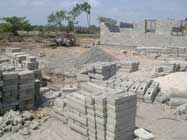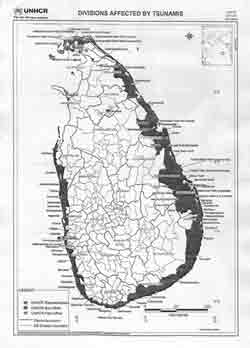SANGAM.ORG
Ilankai Tamil Sangam, USA, Inc.
Association of Tamils of Sri Lanka in the USA
by Meirion Jones, BBC Newsnight, December 19, 2006
|
Nobody would deny then that the current climate is not the best of times for the TRO to work in Colombo and travel in and out of ‘uncleared’ areas of the north and east. The new emergency regulations have only exacerbated a situation of intense insecurity for the Tamil community in general, already marked by abductions, disappearances and extra-judicial killings. Needless to say, the TRO and its staff would be very much in the line of fire. |
Nearly two years after the devastating tsunami in South East Asia, most of the donations given to help the survivors are still sitting in bank accounts.
 BBC Newsnight has learnt that billions of dollars given by individuals and governments have still not been spent while two thirds of those who lost their houses are still waiting for them to be rebuilt.
BBC Newsnight has learnt that billions of dollars given by individuals and governments have still not been spent while two thirds of those who lost their houses are still waiting for them to be rebuilt.
UN tsunami envoy former US President Bill Clinton raised concerns about the slow pace of rebuilding.
"Only 30 to 35% of the people have been put back into permanent housing," he said. "We have to do better than that."
Newsnight has accessed the UN Department for Aid and Development database which tracks $6.7bn (£3.4bn) of money which has been pledged. Half of that - $3.3bn - has still not been spent.
Red Cross
The Red Cross around the world has been given more than $2.2bn. According to their own figures most of that - $1.3bn - is still in the bank.
The Red Cross promised to build 50,000 permanent houses in Indonesia, Sri Lanka and the Maldives. So far only 8,000 have been completed.The British Red Cross contracted to build over 2,000 houses and have so far completed 16 although another 300 are nearly ready.
Disturbing
 Miloon Kothari is the United Nations Special Rapporteur on adequate housing.
Miloon Kothari is the United Nations Special Rapporteur on adequate housing.
He visited the tsunami areas for the UN and he told Newsnight: "When we see figures saying funds have been disbursed but have not been utilised that is very disturbing.
"It should really not take this long to build permanent housing. I do not accept the explanation that it is going to take four to five years, in some cases, seven. I'm an architect I know how long it takes to build a house."
Britain's Disaster Emergency Committee has promised to complete all its projects within three years and they confirmed today that they believe they are on target to do so but the International Red Cross say this is not possible for them.
Their target is to complete half the houses by the third anniversary in a year's time.
Unrealistic
Johan Schaar, who is the head of the tsunami operation for the International Federation of Red Cross says he understands former President Clinton's frustration but these things take time. "I understand his concern and his frustration obviously and we should not be satisfied if anyone still lives under a tent under appalling conditions but I think most of them will live in houses towards the end of next year and then it will take a long time before this effort is fully completed.
"We said a few weeks after the tsunami that for us this was at least a five year effort. Anyone who talked about this being completed in two or three years was totally unrealistic"
Promises
Renewed civil war in the north of Sri Lanka has hampered the rebuilding effort there but it is does not explain the performance of governments in meeting their pledges.
According to the UN DAD database Spain promised $60m and delivered less than $1m. France pledged $79m and came up with just over $1m.
When we contacted them they said "all the figures are confirmed, therefore you can be sure they are accurate".
The Chinese promised even more - $301m - and delivered - just $1m. In the Maldives, Kuwait allocated just under $10m but they have yet to spend a single cent and in Indonesia America promised over $400m and so far has delivered less than $70m.
© 1996-2026 Ilankai Tamil Sangam, USA, Inc.